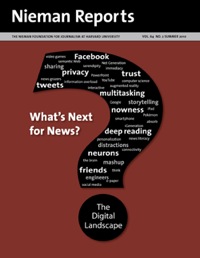 [Our sister publication Nieman Reports is out with its latest issue, and its focus is the new digital landscape of journalism. There are lots of interesting articles, and we’re highlighting a few. Here, Internet provocateur Nicholas Carr writes about the tension between immediacy and understanding online. —Josh]
[Our sister publication Nieman Reports is out with its latest issue, and its focus is the new digital landscape of journalism. There are lots of interesting articles, and we’re highlighting a few. Here, Internet provocateur Nicholas Carr writes about the tension between immediacy and understanding online. —Josh]
“Thought will spread across the world with the rapidity of light, instantly conceived, instantly written, instantly understood. It will blanket the earth from one pole to the other — sudden, instantaneous, burning with the fervor of the soul from which it burst forth.”
 Those opening words would seem to describe, with the zeal typical of the modern techno-utopian, the arrival of our new online media environment with its feeds, streams, texts and tweets. What is the Web if not sudden, instantaneous and burning with fervor? But French poet and politician Alphonse de Lamartine wrote these words in 1831 to describe the emergence of the daily newspaper. Journalism, he proclaimed, would soon become “the whole of human thought.” Books, incapable of competing with the immediacy of morning and evening papers, were doomed: “Thought will not have time to ripen, to accumulate into the form of a book—the book will arrive too late. The only book possible from today is a newspaper.”
Those opening words would seem to describe, with the zeal typical of the modern techno-utopian, the arrival of our new online media environment with its feeds, streams, texts and tweets. What is the Web if not sudden, instantaneous and burning with fervor? But French poet and politician Alphonse de Lamartine wrote these words in 1831 to describe the emergence of the daily newspaper. Journalism, he proclaimed, would soon become “the whole of human thought.” Books, incapable of competing with the immediacy of morning and evening papers, were doomed: “Thought will not have time to ripen, to accumulate into the form of a book—the book will arrive too late. The only book possible from today is a newspaper.”
Lamartine’s prediction of the imminent demise of books didn’t pan out. Newspapers did not take their place. But he was a prophet nonetheless. The story of media, particularly the news media, has for the last two centuries been a story of the pursuit of ever greater immediacy. From broadsheet to telegram, radio broadcast to TV bulletin, blog to Twitter, we’ve relentlessly ratcheted up the velocity of information flow.
To Shakespeare, ripeness was all. Today, ripeness doesn’t seem to count for much. Nowness is all.